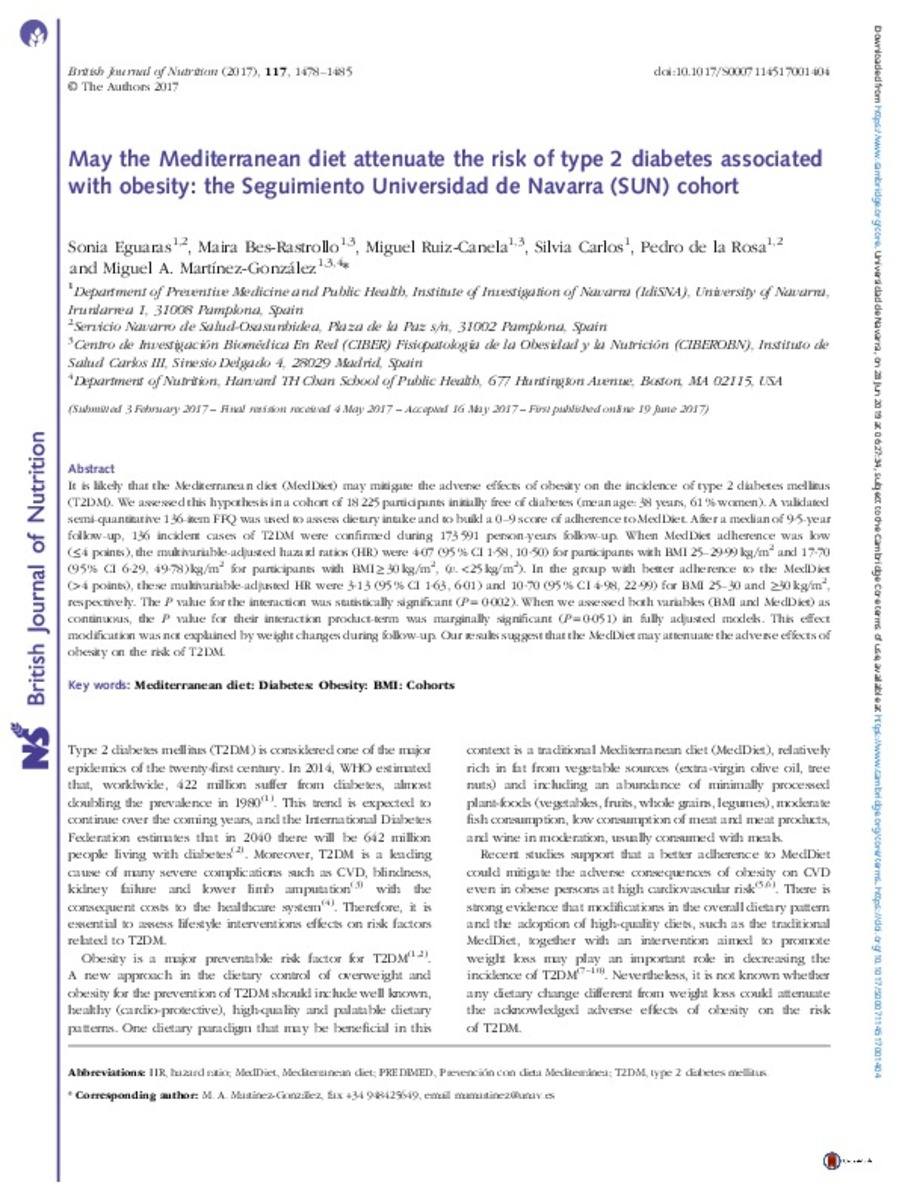Full metadata record
| DC Field | Value | Language |
|---|---|---|
| dc.creator | Eguaras, S. (Sonia) | - |
| dc.creator | Bes-Rastrollo, M. (Maira) | - |
| dc.creator | Ruiz-Canela, M. (Miguel) | - |
| dc.creator | Carlos-Chillerón, S. (Silvia) | - |
| dc.creator | Martinez-Gonzalez, M.A. (Miguel Ángel) | - |
| dc.date.accessioned | 2019-06-28T06:48:42Z | - |
| dc.date.available | 2019-06-28T06:48:42Z | - |
| dc.date.issued | 2017-06-19 | - |
| dc.identifier.citation | Eguaras, S. (Sonia); Bes‐Rastrollo, M. (Maira); Ruiz-Canela, M. (Miguel); et al. "May the Mediterranean diet attenuate the risk of type 2 diabetes associated with obesity: the Seguimiento Universidad de Navarra (SUN) cohort". British Journal of Nutrition. 117 (10), 2017-06-19, 1478 - 1485 | es |
| dc.identifier.issn | 0007-1145 | - |
| dc.identifier.uri | https://hdl.handle.net/10171/57886 | - |
| dc.description.abstract | It is likely that the Mediterranean diet (MedDiet) may mitigate the adverse effects of obesity on the incidence of type 2 diabetes mellitus (T2DM). We assessed this hypothesis in a cohort of 18 225 participants initially free of diabetes (mean age: 38 years, 61 % women). A validated semi-quantitative 136-item FFQ was used to assess dietary intake and to build a 0-9 score of adherence to MedDiet. After a median of 9·5-year follow-up, 136 incident cases of T2DM were confirmed during 173 591 person-years follow-up. When MedDiet adherence was low (≤4 points), the multivariable-adjusted hazard ratios (HR) were 4·07 (95 % CI 1·58, 10·50) for participants with BMI 25-29·99 kg/m2 and 17·70 (95 % CI 6·29, 49·78) kg/m2 for participants with BMI≥30 kg/m2, (v.4 points), these multivariable-adjusted HR were 3·13 (95 % CI 1·63, 6·01) and 10·70 (95 % CI 4·98, 22·99) for BMI 25-30 and ≥30 kg/m2, respectively. The P value for the interaction was statistically significant (P=0·002). When we assessed both variables (BMI and MedDiet) as continuous, the P value for their interaction product-term was marginally significant (P=0·051) in fully adjusted models. This effect modification was not explained by weight changes during follow-up. Our results suggest that the MedDiet may attenuate the adverse effects of obesity on the risk of T2DM. | es_ES |
| dc.description.sponsorship | We have received funding from the European Research Council (Advanced Grant (AdG), LS7, ERC-2013-ADG, PREDIMEDPLUS, PI: M. A. M.-G.), the Spanish GovernmentInstituto de Salud Carlos III, and the European Regional Development Fund (FEDER) (RD 06/0045, CIBER-OBN, grants PI10/02658, PI10/02293, PI13/00615, PI14/01668, PI14/01798, PI14/01764 and G03/140), the Navarra Regional Government (45/2011, 122/2014) and the University of Navarra. | es_ES |
| dc.language.iso | eng | es_ES |
| dc.publisher | Cambridge University Press | es_ES |
| dc.rights | info:eu-repo/semantics/openAccess | es_ES |
| dc.subject | HR hazard ratio | es_ES |
| dc.subject | MedDiet Mediterranean diet | es_ES |
| dc.subject | PREDIMED | es_ES |
| dc.subject | T2DM type 2 diabetes mellitus | es_ES |
| dc.subject | BMI | es_ES |
| dc.subject | Cohorts | es_ES |
| dc.subject | Diabetes | es_ES |
| dc.subject | Mediterranean diet | es_ES |
| dc.subject | Obesity | es_ES |
| dc.title | May the Mediterranean diet attenuate the risk of type 2 diabetes associated with obesity: the Seguimiento Universidad de Navarra (SUN) cohort | es_ES |
| dc.type | info:eu-repo/semantics/article | es_ES |
| dc.identifier.doi | 10.1017/S0007114517001404 | - |
| dadun.citation.endingPage | 1485 | es_ES |
| dadun.citation.number | 10 | es_ES |
| dadun.citation.publicationName | British Journal of Nutrition | es_ES |
| dadun.citation.startingPage | 1478 | es_ES |
| dadun.citation.volume | 117 | es_ES |
Files in This Item:
Statistics and impact
Items in Dadun are protected by copyright, with all rights reserved, unless otherwise indicated.






